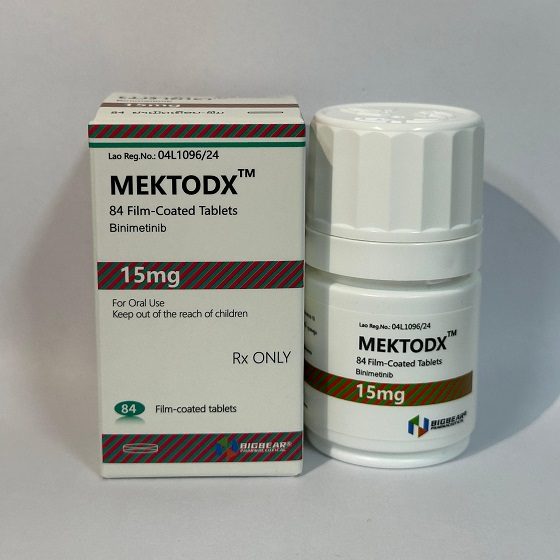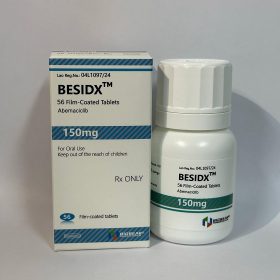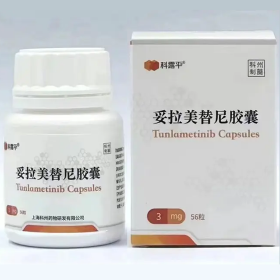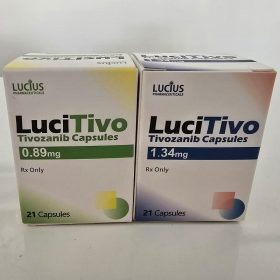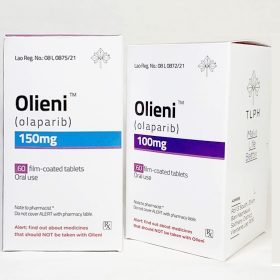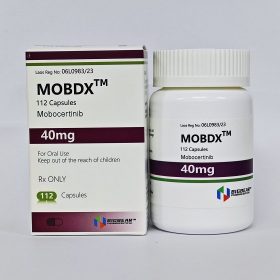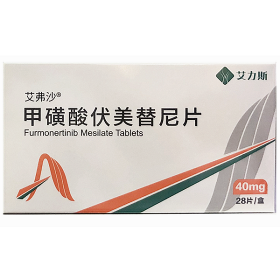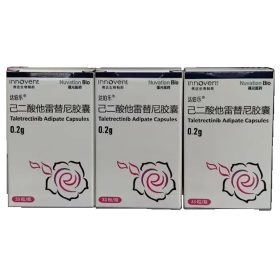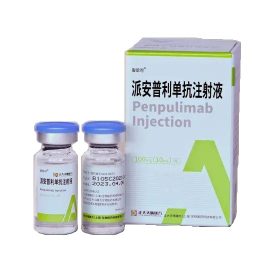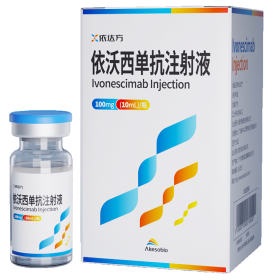- Details
- Description
-
Packaging Size84T/bottle
-
Strength15mg
-
CompositonBinimetinib
-
TreatmentMetastatic melanoma & non-small cell lung cancer (NSCLC) with a BRAF V600E or V600K mutation
-
FormTablet
-
BrandMEKTODK
-
Quantity Unit15mg*84T/bottle
-
ManufacturerBIGBEAR Pharma,Laos PDR
Melanoma
Indicated in combination with encorafenib for patients with unresectable or metastatic melanoma with a BRAF V600E or V600K mutation
45 mg PO BID in combination with encorafenib until disease progression or unacceptable toxicity
See encorafenib drug monograph for recommended dosing information
Non-Small Cell Lung Cancer
Indicated in combination with encorafenib for patients with unresectable or metastatic non-small cell lung cancer (NSCLC) with a BRAF V600E mutation
45 mg PO BID in combination with encorafenib until disease progression or unacceptable toxicity
See encorafenib drug monograph for recommended dosing information
Dosage Modifications
If encorafenib is permanently discontinued, discontinue binimetinib
Recommended dose reductions for binimetinib for adverse reactions
- First dose reduction: 30 mg PO BID
- Subsequent modifications: Permanently discontinue if unable to tolerate 30 mg/day
Cardiomyopathy
- Asymptomatic, absolute decrease in left ventricular ejection fraction (LVEF) of >10% from baseline that is also below lower limit of normal (LLN): Withhold for up to 4 weeks, evaluate LVEF q2Weeks
-
Resume at a reduced dose if the following are present
- LVEF is at or above the LLN and
- Absolute decrease from baseline is ≤10% and
- Patient is asymptomatic
- If the LVEF does not recover within 4 weeks permanently discontinue
- Symptomatic congestive heart failure or absolute decrease in LVEF of greater than >20% from baseline that is also below LLN: Permanently discontinue
Venous thromboembolism
-
Uncomplicated DVT or PE
- Withhold drug; if improves to Grade 0-1, resume at a reduced dose
- If no improvement, permanently discontinue
- Life-threatening PE: Permanently discontinue
Serous retinopathy
- Symptomatic serous retinopathy/retinal pigment epithelial detachments
-
Withhold drug for up to 10 days
- If improves and becomes asymptomatic, resume at same dose
- If not improved, resume at a lower dose or permanently discontinue
Retinal vein occlusion
- Any grade: Permanently discontinue
Uveitis
-
Grades 1-3
- If Grade 1 or 2 does not respond to specific ocular therapy, or for Grade 3 uveitis, withhold for up to 6 weeks; if improved, resume at same or reduced dose
- If not improved, permanently discontinue
- Grade 4: Permanently discontinue
Interstitial lung disease
-
Grade 2
- Withhold for up to 4 weeks; if improved to Grade 0-1, resume at a reduced dose
- If not resolved within 4 weeks, permanently discontinue
- Grades 3 or 4: Permanently discontinue
Hepatotoxicity
-
Grade 2 AST/ALT increased
- Maintain binimetinib dose; if no improvement within 2 weeks, withhold dose until improved to Grade 0-1 or to pretreatment/baseline levels and then resume at the same dose
-
Recurrent Grade 2 or first occurrence of any Grade 3 AST/ALT increased
- Withhold for up to 4 weeks; if improves to Grade 0-1 or to pretreatment/baseline level, resume at reduced dose
- If no improvement, permanently discontinue
-
First occurrence of any Grade 4 AST/ALT increased
- Permanently discontinue OR
- Withhold for up to 4 weeks; if improves to Grade 0-1 or to pretreatment/baseline level, resume at reduced dose; if no improvement, permanently discontinue
-
Recurrent Grade 3 AST/ALT increased
- Consider permanently discontinuing
-
Recurrent Grade 4 AST/ALT increased
- Permanently discontinue
Rhabdomyolysis or CPK elevations
- Grade 4 asymptomatic CPK elevation OR any Grade CPK elevation with symptoms or with renal impairment
- Withhold dose for up to 4 weeks; if improved to Grade 0-1 resume at a reduced dose
- If not resolved within 4 weeks, permanently discontinue
Dermatologic
- Grade 2: If no improvement within 2 weeks, withhold drug until Grade 0-1; resume at same dose if first occurrence or reduce dose if recurrent
- Grade 3: Withhold until Grade 0-1; resume at same dose if first occurrence or reduce dose if recurrent
- Grade 4: Permanently discontinue
Other adverse reactions, including hemorrhage
- Dose modification when administered with encorafenib is NOT recommended for palmarplantar erythrodysesthesia syndrome (PPES), noncutaneous RAS mutation-positive malignancies, and QTc prolongation
-
Recurrent Grade 2 or first occurrence of any Grade 3
- Withhold for up to 4 weeks; if improves to Grade 0-1 or to pretreatment/baseline level, resume at reduced dose
- If no improvement, permanently discontinue
-
First occurrence of any Grade 4
- Permanently discontinue OR
- Withhold for up to 4 weeks; if improves to Grade 0-1 or to pretreatment/baseline level, resume at reduced dose; if no improvement, permanently discontinue
-
Recurrent Grade 3
- Consider permanently discontinuing
-
Recurrent Grade 4
- Permanently discontinue
Hepatic impairment
- Moderate (total bilirubin >1.5 to ≤3 x ULN and any AST): 30 mg PO BID
- Severe (total bilirubin >3 x ULN and any AST): 30 mg PO BID
Renal impairment
- No clinically important changes in binimetinib exposure were observed with severe renal impairment as compared with patients with normal renal function
Dosing Considerations
Limitations of use: Not indicated for patient with wild-type BRAF melanoma
Patient selection
- Melanoma: Confirm the presence of a BRAF V600E or V600K mutation in tumor specimens before initiating
- NSCLC: Confirm the presence of a BRAF V600E mutation in tumor specimens before initiating

